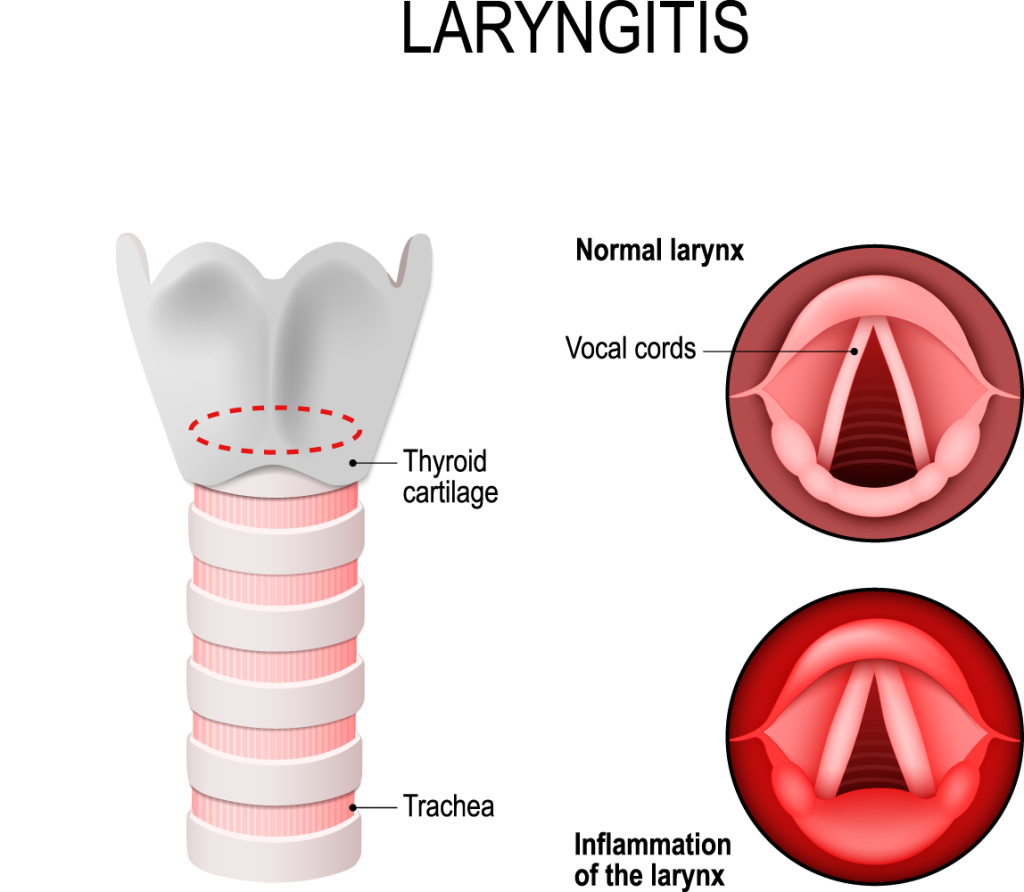Have you ever woken up to find your voice is scratchy, hoarse, or completely gone? The likely cause is laryngitis, a common condition that affects your voice box. While usually temporary, understanding what causes it—and how to treat it—can help you get back to chatting it up.
What is laryngitis?
Laryngitis is the inflammation of your larynx, more commonly known as your voice box. Inside the larynx are your vocal cords—two folds of mucous membrane that vibrate to produce sound. When these cords become inflamed, they swell and can’t vibrate properly, leading to the classic symptoms: hoarseness, reduced volume, or even a complete loss of voice.

Common causes of laryngitis
Laryngitis can be acute (short-term) or chronic (long-term), with different underlying causes.
Acute laryngitis
Typically caused by:
- Viral infections – The most common cause, often occurring alongside a cold, flu, or bronchitis.
- Bacterial infections – Less common, but still a possible cause.
- Vocal strain – Yelling, singing loudly, or prolonged speaking can irritate the vocal cords.
- Irritants – Exposure to smoke, allergens, chemical fumes, or excessive alcohol can lead to inflammation.
Chronic laryngitis
Lasting longer than three weeks, chronic laryngitis is often caused by ongoing irritation or injury to the vocal cords. Common causes include:
- Gastroesophageal reflux disease (GERD) – Stomach acid backing up into the throat can inflame the vocal cords.
- Chronic sinusitis – Post-nasal drip can continuously irritate the larynx.
- Smoking or excessive alcohol use – Long-term exposure to irritants leads to chronic inflammation.
- Environmental irritants – Workplace exposure to dust, chemicals, or pollutants.
- Vocal cord lesions – Nodules, polyps, or cysts caused by chronic vocal abuse.
- Neurological conditions – Less common, but certain conditions can affect vocal cord movement.
Recognizing the symptoms
The hallmark symptom of laryngitis is a change in your voice, which may include:
- Hoarseness
- Weak voice or voice loss
- Sore throat
- Tickling sensation or rawness
- Dry cough
- Frequent throat clearing
If laryngitis is caused by an infection, you might also experience fatigue, fever, or swollen lymph nodes.
When to see a doctor
Most acute cases of laryngitis resolve within a week with simple home care. However, see a doctor if:
- Your hoarseness lasts longer than two to three weeks
- You experience sudden, severe pain when swallowing
- You have difficulty breathing or swallowing
- You develop a fever that doesn’t go away
- You cough up blood
- Your child has hoarseness along with a high fever, drooling, or breathing trouble—these could be signs of a more serious condition like croup or epiglottitis
“While common, persistent voice changes should never be ignored. If your laryngitis symptoms linger, or if you experience severe pain or breathing difficulties, it’s crucial to have an ENT specialist evaluate your vocal cords. Early diagnosis and treatment can prevent more serious complications and help preserve your voice health.”
Treatment and home care tips
Treatment depends on the cause. For most acute cases, home care is effective:
- Rest your voice – Avoid talking, whispering, singing, or yelling. Use non-verbal communication when possible.
- Stay hydrated – Drinking plenty of fluids keeps your vocal cords moist.
- Use a humidifier – Moist air can soothe the throat and help reduce inflammation.
- Avoid irritants – Steer clear of smoke, alcohol, and other triggers that may worsen symptoms.
- Soothe your throat – Gargle with salt water, suck on lozenges, or chew gum to stay comfortable.
- Skip the decongestants – These can dry out your vocal cords and make symptoms worse.
For chronic laryngitis, the key is treating the underlying cause. This might mean managing GERD, quitting smoking, or treating sinus problems. In some cases, voice therapy or other medical treatments may be recommended.
Minnesota ENT can help
At Minnesota ENT, we diagnose and treat a wide range of ear, nose, and throat conditions—including persistent voice issues. If your laryngitis won’t go away, or if you’re worried about ongoing hoarseness or vocal changes, we’re here to help.
Don’t let laryngitis keep you silent. Schedule an appointment today and get your voice back.
📞 Call us: 763-233-5755
📱 Text us: 763-265-6087
💬 Message us via our one-click chat tool
Appointments available in Golden Valley, Maple Grove, and Robbinsdale

